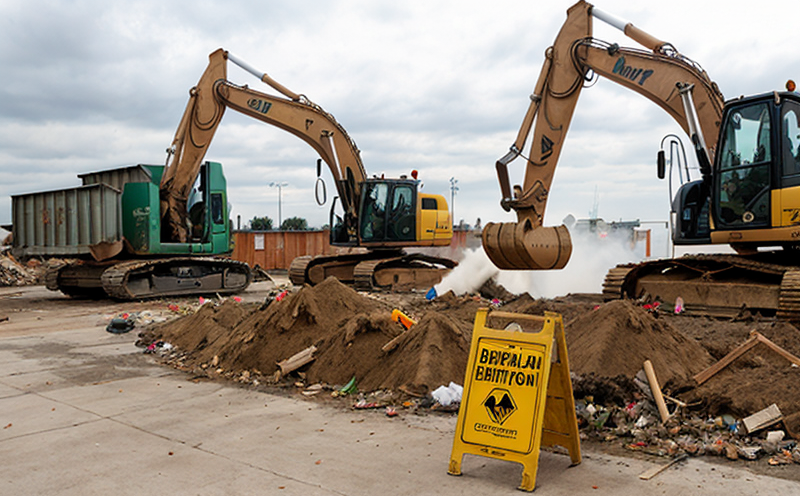EN 13139 Recycled Aggregates for Mortar Evaluation
The European Standard EN 13139 specifies the methods for evaluating recycled aggregates intended to be used in mortar. This standard is particularly relevant within the construction and demolition waste sectors, ensuring that recycled materials meet the necessary quality requirements for use in building applications.
The primary purpose of this test is to assess the suitability of recycled aggregates for incorporation into mortars, which are critical components in various construction projects such as masonry works, wall repairs, and flooring. The standard provides a framework for testing physical properties like particle size distribution, shape factors, and durability, alongside chemical and mechanical parameters.
Physical properties are crucial because they influence the performance of the mortar once it is mixed with cementitious materials. For instance, poor particle size distribution can lead to inconsistencies in the mixing process, affecting both the workability and strength of the final product. The shape factors determine how well the aggregates pack together, impacting the overall stability and density of the mixture.
Chemical properties are equally important as they ensure that the recycled aggregates do not introduce adverse effects on the chemical balance within the mortar. This includes checking for potential alkali-silica reactions (ASR) which can cause deterioration in concrete structures over time if not properly managed.
Mechanical tests further evaluate the strength and durability of these recycled materials under various conditions, including compression and abrasion resistance. These characteristics are vital given that construction sites often face harsh environmental conditions where structural integrity must be maintained.
By adhering to EN 13139, laboratories can provide reliable data on how well recycled aggregates perform in real-world scenarios, thereby supporting sustainable practices by reusing waste materials from demolition projects effectively. This not only contributes towards reducing landfill pressures but also enhances resource efficiency within the industry.
Scope and Methodology
| Parameter | Description |
|---|---|
| Particle Size Distribution | This test ensures that the recycled aggregates have an appropriate range of particle sizes to promote optimal mixing with other components in mortars. |
| Shape Factors | Evaluates the angularity and flatness of particles which affects their interlock potential within the mortar matrix. |
| Durability Tests (e.g., Freeze-Thaw Resistance) | Assesses long-term performance against environmental stresses like freezing and thawing cycles common in outdoor construction environments. |
| Chemical Composition Analysis | Identifies any hazardous elements present that could react negatively with other materials during mixing or over time. |
| Mechanical Strength Testing | Determines the compressive and tensile strengths of samples after undergoing standardized loading tests. |
The methodology outlined in EN 13139 involves several stages including sample preparation, testing procedures, and interpretation of results. Samples must first be prepared according to specified guidelines ensuring uniformity across all specimens tested. Then, various instruments are employed depending upon the specific parameter being evaluated - sieves for particle size distribution analysis, scanning electron microscopes (SEM) for examining surface morphology closely, among others.
Once collected and analyzed, data points from these tests form part of a comprehensive report detailing the performance characteristics of each batch of recycled aggregates. This detailed documentation helps stakeholders make informed decisions about whether or not to proceed with using said materials in their projects.
Why Choose This Test
Selecting EN 13139 Recycled Aggregates for Mortar Evaluation ensures that your construction project adheres strictly to international standards, thereby enhancing the reliability and safety of the final product. By validating compliance through rigorous testing procedures, you can rest assured knowing that every component used in your structure meets stringent quality benchmarks.
For quality managers responsible for ensuring consistent product quality throughout production processes, this test provides a crucial tool for maintaining high standards. Compliance officers will find it invaluable when auditing suppliers to ensure they meet regulatory requirements. R&D engineers benefit from having access to detailed analytical results which inform ongoing improvements in material formulations and application techniques.
Moreover, by choosing this service, you contribute positively towards environmental sustainability goals. Using recycled materials reduces dependency on virgin resources while minimizing waste sent directly to landfills. Such practices align with broader corporate social responsibility initiatives aimed at fostering greener operations within the industry.
Customer Impact and Satisfaction
- Achieves compliance with international standards, thereby enhancing reputation.
- Ensures consistent product quality across batches, reducing variability.
- Supports sustainable practices by promoting reuse of waste materials.
- Facilitates informed decision-making among stakeholders involved in construction projects.
- Provides transparent documentation aiding traceability and accountability.
- Enhances safety margins through thorough validation processes.
Clients who opt for this service experience peace of mind knowing that their choice contributes to both operational excellence and environmental responsibility. Positive feedback from satisfied customers highlights the value placed on reliable testing services that cater specifically to meeting stringent industry standards.





